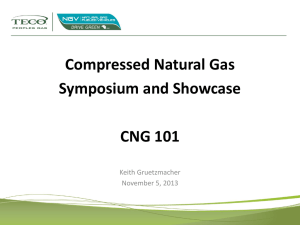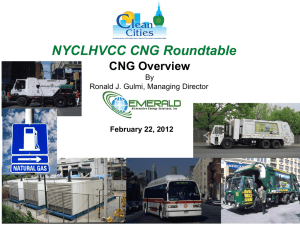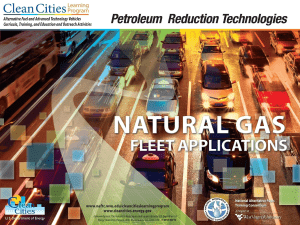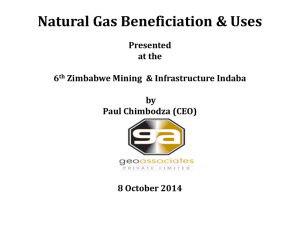NATURAL GAS VEHICLES:
advertisement
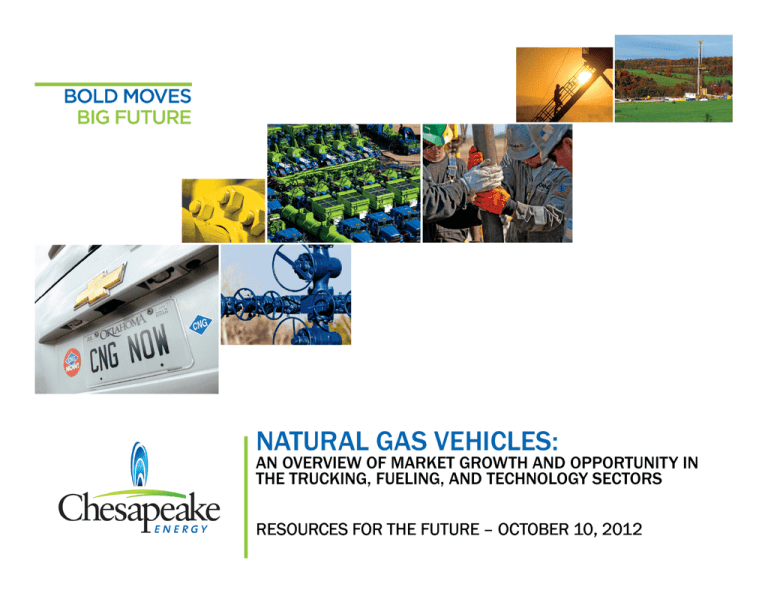
NATURAL GAS VEHICLES: AN OVERVIEW OF MARKET GROWTH AND OPPORTUNITY IN THE TRUCKING, FUELING, AND TECHNOLOGY SECTORS RESOURCES FOR THE FUTURE – OCTOBER 10, 2012 CHESAPEAKE ENERGY CORPORATION Founded in 1989 with a $50,000 investment by our co-founder and CEO – Aubrey McClendon Leader in production › Largest gross producer of U.S. natural gas (#2 on net basis) › Top 15 producer of U.S. liquids Leader in drilling › #1 driller in the world of horizontal wells and horizontal shale wells › Most active driller in the U.S. − 100operated drilling rigs (#2 most active operates 60, #3 operates 56) Leader in identifying and capturing world-class unconventional natural gas and liquids resources › In past 5 years, discovered 5 of America’s best unconventional plays Leader in technological innovations in unconventional reservoirs › #1 inventory of shale core rock data and built industry’s only proprietary core analysis facility Leader in vertical integration into midstream and oilfield service operations America’s Champion of Natural Gas CHK’S 10 KEY PLAYS Low-risk, U.S. onshore asset base; not exposed to economic, geopolitical or technological risks internationally or in the Gulf of Mexico Once our asset sales are complete we will exclusively focus on 10 leading plays in which we have a #1 or #2 position 3 THE BIG 4 U.S. NATURAL GAS SHALE PLAYS: WORLD CLASS DISCOVERIES WORLD GAS FIELDS BY RECOVERABLE RESERVES 1400 600 500 500 400 300 200 100 0 235 222 138 123 110 95 81 73 70 68 48 47 46 45 44 42 42 THE “JUST IN TIME” INVENTORY APPROACH TO NATURAL GAS SUPPLIES $9 $8 Breakeven Gas Price ($/mcf) $7 BASIN ECONOMICS – GAS PRICE REQUIRED FOR 10% RATE OF RETURN * Economics assume $100/bbl crude Dry gas Low liquids gas High liquids gas Oil TPH Long-term Gas Price $6 $5 TPH Medium-term Gas Price $4 Current Gas Prices $3 $2 $0 Niobrara Fracture Vertical Permian Niobrara High Resistivity Monterey Bakken Wolfcamp Midland Utica Condensate New Mexico Vertical Bone Spring Eagle Ford Oil California Uinta Oil Barnett Combo MS Lime DJ Basin Eagle Ford Condensate Marcellus SW PA GOM deep gas Cleveland Tonkawa Avalon Wolfcamp Delaware Marcellus NE PA Anadarko-Woodford Wet Haynesville Core Marcellus Central Barnett Core Granite Wash Anadarko-Woodford Pinedale Fayetteville Arkoma-Woodford Jonah Haynesville Non-Core Arkoma Barnett Non-Core South Texas Powder River Anadarko Anadarko-Woodford Dry Piceance Eagle Ford Gas East Texas Conventional Niobrara Low Resistivity Appalachia Gas $1 Gas produced from oil and liquids-rich plays is ~17% of the total of the gas stack. These plays account for ~35% of the gas growth going forward. Source: Tudor Pickering – May ‘12 • The basin economics will help large energy consumers have confidence in a lowpriced transportation fuel for years to come. • These fields are largely “held by production” which means the subsequent wells are bolstered by a preexisting infrastructure and gathering system • These economics and basin realities will enable supplies to quickly respond to price signals 5 5 VERTICAL VS. HORIZONTAL DRILLING vs. Vertical Wells Horizontal Wells Our ability to drill subsequent wells form one padsite allows new natural gas supplies to come online and achieve scale much quicker.6 NATURAL GAS UTILIZATION SUMMARY Macroeconomic Factors are Affecting Energy Prices in the U.S. › Greater global consumptions of crude oil › Emerging economies vying for limited resources Recoverable Domestic Supplies of Natural Gas are at All-Time Highs › Shale gas has significantly increased U.S. supply › Productive capacity of shale places continued downward pressure on natural gas prices Chesapeake has Achieved Significant Fuel Savings from CNG Vehicles › Lower fuel costs › Surprising resale value for used CNG vehicles Auto Manufacturers are Providing More Options › Big 3 OEMs are developing production vehicles running on CNG › Heavy-duty and vocational truck manufacturers are increasing market share Infrastructure Development is Keeping Pace › Fuel marketers are joining the game for both light- and heavy-duty refueling › Pricing economics are attractive for retailers and consumers alike › Innovation continues on fuel delivery options 7 AMERICA ON THE BOTTLE U.S. consumes 23% of the world’s oil, 19 mm bbls/day, of which 11 mm bbls/day is imported By 2020, the IEA predicts world oil consumption will increase 60% › This does not take production decreases into account › This means we will need 4 more Saudi Arabias… where will they be? To keep pace with demand and depletion, the world must add 64 million barrels of production per day by 2020: › This growth will require $350 billion per year in drilling capex on new projects › Yet, OPEC only spent $390 billion in total on new projects from period 2000-2007; where will required funding come from with rising OPEC social costs? › The U.S. is exporting $1 mm per minute to import oil, that’s $500 billion per year and $5 trillion per decade – can we afford that drag on our economy? Let’s get off the foreign oil bottle in the next 10 years! HOW WILL AMERICA DEAL WITH $5/GALLON GASOLINE OR DIESEL? Current domestic and international challenges will likely keep upward pressure on the price of diesel in 2012 and beyond Will Israel Attack Iran? January 25, 2012 › Refinery constraints in 2012 – 2015 › Diesel exports have increased by 28% since 2010 › Geopolitical issues, particularly associated with Iran − Israel vs. Iran – Strait of Hormuz Action – both economic and military conflict – likely to occur in 2012 − Saudi Arabia and other countries – developing petroleumbased manufacturing economies Exports vs. internal consumption? › Global oil consumption growing at a steady pace, especially in Mideast, China, India and all of SE Asia 10 year curve for oil = ~$100 per bbl 10 year curve for U.S. natural gas = $25 per bbl equivalent How can Americans resist a $75 per bbl ($1.80/gallon) discount on fuel costs? Chinese vehicle ownership per capita is equal to where the U.S. was in 1919 yet its overall oil consumption is already 50% of U.S. and 12% of world’s FUEL PRICE DIFFERENTIAL FORECAST Source: TIAX Report : “U.S. and Canadian Natural Gas Vehicle Market Analysis,” May 2, 2011 NATURAL GAS VEHICLES ARE AN ANSWER TO RISING FUEL PRICES Price of Oil vs. Natural Gas $/bbl $160 Pre-2005 Historical Spread 1:1 Btu ratio $140 $120 2005-2010 Avg. Spread 1.5:1 Btu ratio *(Energy Feedstock Ratio: CNG 8:1, LNG 7:1) Forward Spread 7:1 Btu ratio $/mcf NYMEX Henry Hub $10 $80 $8 $60 $6 $40 $4 $20 $2 $0 $0 CNG will be $1.50/dge ($0.50) LNG will be $2.00/dge ($0.57) If NYMEX is $8.00/mcf › › $12 $100 If NYMEX is $4.00/mcf › › $16 $14 NYMEX WTI CNG will be $2.00/dge ($1.00) LNG will be $2.50/dge ($1.14) If NYMEX is $12.00/mcf › › CNG will be $2.50/dge ($1.50) LNG will be $3.00/dge ($1.71) This is why AT&T, UPS, Verizon, Waste Management, etc. are switching to natural gas – they can save millions on fuel costs 11 Source: Bloomberg (as of 3/9/12) GASOLINE AND DIESEL PRICING FACT: Changes in the price of Natural Gas have a much smaller effect on pump prices compared to changes in the price of Crude Oil on gasoline and diesel prices. Source: U.S. Energy Information Administration CNG SALES PROFITABILITY IS THE KEY DRIVER FOR INFRASTRUCTURE DEVELOPMENT On July 24, 2012 the NYMEX spot price for natural gas closed at $3.02/MMBtu. These low commodity prices are a boon for CNG retail profit margins. Pump price of $1.99/gge INPUT COST Pump price of $2.45/gge INPUT COST Natural Gas (divide by 8.0) $0.38 Natural Gas (divide by 8.0) $0.38 Transport Costs & Fees $0.25 Transport Costs & Fees $0.25 Electricity Costs per GGE $0.15 Electricity Costs per GGE $0.15 Maintenance per GGE $0.26 Maintenance per GGE $0.26 Federal and State Taxes $0.25 Federal and State Taxes $0.25 Fuel Card Fees per GGE $0.03 Fuel Card Fees per GGE $0.03 Retailer Profit Margin $0.70 Retailer Profit Margin $1.14 CNG at the Pump $1.99 CNG at the Pump $2.45 WHERE IN THE WORLD? NATIONAL FLEETS WITH NGVS NATURAL GAS TRANSPORTATION SUPPLY CHAIN SYNERGIES: IMPRESSIVE WEB OF OPPORTUNITIES FOR ALL STAKEHOLDERS States Fleets Retailers Technology Technological Innovation Infrastructure BuyBuy-In Robust Market For State Fleet Vehicles End User Utilization Oklahoma is an Example of Collaborative Infrastructure Growth Current as of August 22, 2012 17 ADDITIONAL STRATEGIC GROWTH MARKETS 18 HD-CNG VS. LNG Clean Energy and Pilot-Flying J Shell and TravelCenters of America › 19 locations completed › At least 100 TA locations › Willing to add L/CNG to locations with fuel commitment › Agreement allows for LNG and CNG › Seeking liquefaction sources › Motivated by requests from existing customers CNG 400 miles LNG 550 miles Dual Fuel 550+ miles Source: Source U.S. Department of Energy, Energy Information Administration, U.S. LNG Markets and Uses: June 2004 (recreated by TIAX) 19 THE FOUNDATION FOR NATURAL GAS TRUCKING AT TRAVEL STOPS IS BEING BUILT TODAY; HOWEVER, MORE IS NEEDED FOR EXPEDITED ADOPTION Map: Clean Energy’s America’s Natural Gas Highway 1st Mover: • • CHK, Clean Energy, and Pilot Flying J ~ 100 LNG Travel Stop Stations (above) Source: Clean Energy Fuels Corporation 2nd Mover: • • Shell and TravelCenters of America/Petro ~ 100-200 LNG/CNG Travel Stop Stations 20 HD NATURAL GAS ENGINE AVAILABILITY Manufacturer Engine HP & Torque Fuel Source Availability Cummins Westport ISL-G 8.9L 320 HP – 1000 #/ft Natural Gas Available Cummins Westport ISX-G 11.9L 400 HP – 1400 #/ft Natural Gas 1Q 2013 Cummins ISX 15L TBD Natural Gas 2014 Westport HD HD15L 550 HP – 1850 #/ft NG/Diesel 1Q 2013 Navistar Phoenix 7.6L 300 HP – 860 #/ft Natural Gas Available Navistar Maxxforce 13L 430 HP – 1550 #/ft NG/Diesel 4Q 2013 Volvo-Westport HD 13L TBD NG/Diesel 2014 OVER-THE-ROAD PLATFORM OFFERINGS Cummins Westport ISLISL-G 8.9L Volvo VNM Kenworth T440 Kenworth T800SH Kenworth W900S Freightliner M2 Cummins Westport ISXISX-G 11.9L Volvo VN Series Mack Pinnacle Kenworth T660 Freightliner Cascadia Westport HD GX 15L Kenworth T800 Peterbilt 386 Peterbilt 388 Peterbilt 384 Peterbilt International Transtar, Workstar International Prostar+, Workstar DUAL-FUEL TECHNOLOGY What is Dual-Fuel? › Non-invasive technology is applied to an existing diesel engine › Runs on diesel and natural gas, simultaneously › Small pilot injection of diesel ignites gas mixture under high pressure › Diesel-to-gas substitution of up to 70%; averaging 40-65% › Engine can still run on 100% diesel › Can utilize CNG or LNG › Diesel performance and efficiency › Typically requires emission controls • 50+ OUL certifications for CAT and Detroit Diesel engine families • Partnership formed with Univ. of Houston to certify “Intermediate Age” engines with same system OUL is >435,000 miles / 22,000 hour / 10+ yrs • 2004 to 2009 Cummins ISX15 • Only for OUL engines • Now aiming for Detroit Diesel, Mack and Cat engines that are IUL CNG IN A BOX™ 8’ 20’ 8’ Partnership between GE & Peake Fuel Solutions Up to 7.5 GGE/min at 39 PSIG Modular design allows for increased performance through additional compressors “Plug and play” solution 3M PRESSURE VESSELS 25 MARKET FORECAST AND MARKET REALITY Worldwide market for light duty NGVs will grow steadily over the next 7 years, reaching 3.2 million vehicles sold in 2019 U.S. DOE can certify an accurate count of 1,066 CNG stations and 54 existing LNG stations Result in a cumulative total of 25.4 million light duty NGVs on the road by 2019 Stations planned now include 96 CNG stations and 98 LNG stations The largest regional market for NGVs by the end of this decade will be Asia Pacific, thanks largely to Pakistan, which had 2.7 million NGVs on the road at the end of 2012, as well as strong growth in countries like Thailand, India, and China Since June 2012, an addition of 19 existing CNG and 1 existing LNG stations Sales of NGVs will also grow at a healthy pace in North America, with a compound annual growth rate of 10.2% from 2012 to 2019 Since mid-2010, stations under construction have shown an increase of 231% for CNG stations and 9,700% for LNG Stations Source: Pike Research, 2012 Since 2009, an increase of 38.1% in existing CNG stations and 50% in LNG stations › 47% of CNG stations are now open to the public › 44% of LNG stations are now open to the public Source: US DOE – Alternative Fuels Data Center, 7/18/12 26 WHERE TO FROM HERE? The new reality on natural gas prices is that we have long-term value creation with an affordable, predictable, domestic fuel OEMs will release engines to cover all applications Infrastructure is growing and the key to development exists with the current market › Sustainable scale will come through large retailers like Pilot Flying J, Love’s Travel Stops, and Travel Centers of America. Federal government should encourage growth and ensure GSA and GAO assets are shipped on domestics fuels › States will lead in development 27 THANK YOU FOR YOUR TIME Chesapeake Headquarters 6100 N. Western Avenue Oklahoma City, OK 73118 Web site: www.chk.com Contact Information: 2012 G. Michael Brown Manager - Market Development (817) 240-3807 Michael.Brown@chk.com APPENDIX GLOBAL NATURAL GAS VEHICLE MARKET PERSPECTIVE Lack of domestic oil reserves or insufficient refining capacity to meet transportation demands with petroleum fuels only. Domestically available and cost advantageous natural gas resources. Favorable natural gas fuel price differentials compared to petroleum fuels Well-established gas transmission and distribution networks coincident with major transport routes Source: National Petroleum Council, 2012 very diverse economic, environmental, and regulatory factors have supported the deployment of NGVs in different regions Urban air quality concerns Lack of stringent emissions standards, resulting in a low adoption of advanced vehicle emissions controls Regulations and policies for either GHG mitigation or energy security purposes that either mandate alternative fuels or incentivize their use the IEA estimates that in 2006 there were 800 million Light Duty Vehicles the global NGV market growth trend represents a compounded annual growth rate of 23.2% over the period of 2003 to 2010 IEA forecast that the LDV fleet could reach 2 billion vehicles by 2050 30 NATURAL GAS IS A CLEAN ALTERNATIVE TO EXISTING TRANSPORTATION FUELS Fossil Fuel Emission Levels Pounds per Billion Btu of Energy Input Pollutant Natural Gas Oil Coal The Natural Gas Advantage Carbon Dioxide 117,000 164,000 208,000 44% Carbon Monoxide 40 33 208 81% Nitrogen Oxides 92 448 457 80% Sulfur Dioxide 1 1,122 2,591 99.9% Particulate Matter 7 84 2,744 99.7% Mercury 0.000 0.007 0.016 100% Water Used for Transportation Fuels Compressed Natural Gas (CNG) Source: Adapted from King and Webber 2008a; *Adapted from King and Webber 2008b, combined with data from USDOE 2006 32 ARE OUR OPERATIONS REGULATED? Our operations are regulated by federal, state and local agencies from start to finish and are specific to local terrain and climate Leasing Land Seismic Assessments Site Preparation Drilling Well Completion Production Restoration 33 CNG AND LNG BASICS 34 FUEL SUPPLY CHAIN COMPARISON HOW DOES A CNG STATION WORK? CNG PRICING FUNDAMENTALS • Natural gas is priced on the New York Mercantile Exchange (NYMEX) in $/Million cubic feet (Mcf). • CNG is priced as a Gasoline Gallon Equivalent (GGE), which is the volume of natural gas necessary to equate to the energy content in British Thermal Units (BTU) of a gallon of gasoline. • One Mcf of natural gas contains approximately 1,000,000 BTU, and one GGE of CNG contains approximately 125,000 BTU, an 8:1 ratio. • Therefore, the commodity component of the pump price of CNG can be calculated by dividing the NYMEX price by 8. NYMEX Price of $3.00 ÷ 8 = CNG commodity price of $0.38
